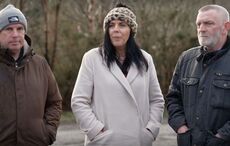Meeting Mickey Rourke, 52, feels more like meeting a rock star than an actor. One thing's for certain, he doesn't disappoint.
Flanked by two female assistants and dressed in an eye-catching striped jacket with a dapper silk handkerchief exploding from his breast pocket during a recent press day in New York to promote his stunning comeback film "The Wrestler," Rourke doesn't just enter a room. He arrives.
The aging rock star aura is justified. Rourke's recorded tracks with David Bowie, he's a friend of Bruce Springsteen (who provides the title track for "The Wrestler") and he's partied with the notorious murdered rap star Tupac Shakur.
But this cold December morning in New York City the comeback kid has a bad case of the jitters.
"I'm just nervous, man," he tells the Irish Voice. "I've been out in the wilderness for a long time and I don't want to screw this up, you know?"
This unmistakable humility is the key to his character. Rourke hails from a working class Irish American family in Schenectady, New York and he's the kind of man who calls it like he sees it, and because of that it's impossible not to warm to him immediately.
"Most people are full of s***," "The Wrestler" director Darren Aronofsky says. "Mickey's not like that. The audience instinctively gets that he isn't. An actor with that quality is very hard to find."
And here's another surprise about Rourke in person you don't expect - his sensitivity and shyness are obvious.
The Irishness of Rourke's temper, his attitudes and his issues with authority figures are unmistakable, too.
According to his close friends, with Mickey Rourke once you're in you're in for life, but if you're out there won't be any second chances.
And he's not afraid to let you know it in pretty colorful language. This is the man who memorably called Tom Cruise the f-word for attacking psychiatry and the actress Brooke Shields.
Said Rourke, "My therapist saved my f***ing life and my career. I don't care what Tom Cruise says about therapy. F*** him. Picking on poor Brooke Shields. People need medicine and they need therapists. Let the Scientologists go f***ing live on a planet of their own."
"The Wrestler" hasn't just revived Rourke's fortunes; they've resurrected his career from the dead.
In Hollywood, where you're only as good as your last picture, Rourke's staggering performace as a broken down wrestler faced with one last chance to redeem himself (the film won the coveted Golden Lion at the Venice Film Festival) has pulled him from near obscurity to confident talk of a Best Actor nod at next year's Oscars.
But the vertigo of the sudden ascent from skid row back to easy street when it really looked like his luck had run out for good has hit Rourke hard, and he's taking nothing for granted now. It doesn't help that the theme of "The Wrestler" is so close to his own life experience, too.
As Randy the wrestler, or "The Ram" as he's known to his wrestling fans, Rourke plays a former champion whose glory days are all behind him.
It's the greatest performance of Rourke's career.
The film breaks your heart and sends you reeling into the street at its conclusion. It's surefire Oscar bait.
Said Rourke, "It feels so strange to be back in the public eye. It's painfully nice. Because I was on the bench for 13 years.
"After 10 years go by you start thinking, 'Man is it really f***ing over like everybody says?' And then I live in LA, where they find ways to remind you every f***ing day. Go for a pack of cigarettes at two in the morning and stand in a line of five or six people, some jerk is going to say, 'Hey, didn't you used to be a star?' All you can say is give me my cigarettes and let me get the f*** out of here."
Rourke's painful real life experiences and the way he channels them into his film work now have made him a better, more interesting actor. "'9 1/2 Weeks' and 'Angel Heart' were a long f***ing time ago. It's like a fighter talking about an old fight in the gym. You see that all the time," he says.
"When your time has come and gone and it's the only thing you know, you can't go and be a goddamn busboy somewhere. There aren't many options for people who have lived that way. It doesn't matter if you're a boxer, a football player, a wrestler or a Hollywood actor. It's all you do."
Playing Randy the Ram in "The Wrestler" meant a vigorous exercise regime to get in training. Rourke knew if people were going to take him seriously he would have to really look the part.
It wasn't enough that he had lived it. He succeeded too, but he chalked up three MRIs in the process.
Said Rourke, "Over six months I worked to put on muscle and the weight. I'd eat seven or eight meals a day, then do the weight lifting and then the cardio, I started living in the gym. I haven't been back since I made the movie. I had this Israeli ex-army commando guy, a martial arts champion, training me. He really put the wood to me."
Rourke's wilderness years - basically most of the 1990s and a good part of this decade - saw him quit acting for boxing. For his efforts he got a broken nose, toe, ribs, a split tongue and a compressed cheekbone.
Then when work got scarce and things got really bad he sold his nine Harley Davidson motorbikes just to make the rent.
Asked if he's exorcised all the old attitudes and demons that led to all the trouble in the first place, he sighs. Rourke has partied harder and fallen further than most people ever will, and he's lived to tell the tale.
"All you have is hope. You can't live on the glory of what you used to do. You can't pay your rent or get a drink on that. Along the way some people remembered and helped. Sean Penn went out of his way to get me a day on 'The Pledge.' Sylvester Stallone saw me eating alone at a restaurant one night when I could hardly pay for my spaghetti and he put me in 'Get Carter.' Things like that. It was a slow journey back."
For years, Rourke has also been quietly sustained by his Catholic faith. All his earlier bragging of knowing mobsters and hanging out with the ultimate fast crowd is gone.
His convictions, though, aren't hard to discover, and neither are his political views. Asked about the big tattoo on his left arm in open support of the IRA he says, "Don't be getting me in trouble, man. I'm at a point that I behaved so terribly when I had a chance. I wasn't accountable. I wasn't responsible. I wasn't misunderstood - I just behaved terribly.
"I had a fuse burning inside of me that I couldn't put out. It's only recently that I began to understand why I behaved the way I did with authority figures. Only when you understand can you make a change. It took a decade for me to get my act together."
"The Wrestler" is now open nationwide.




Comments